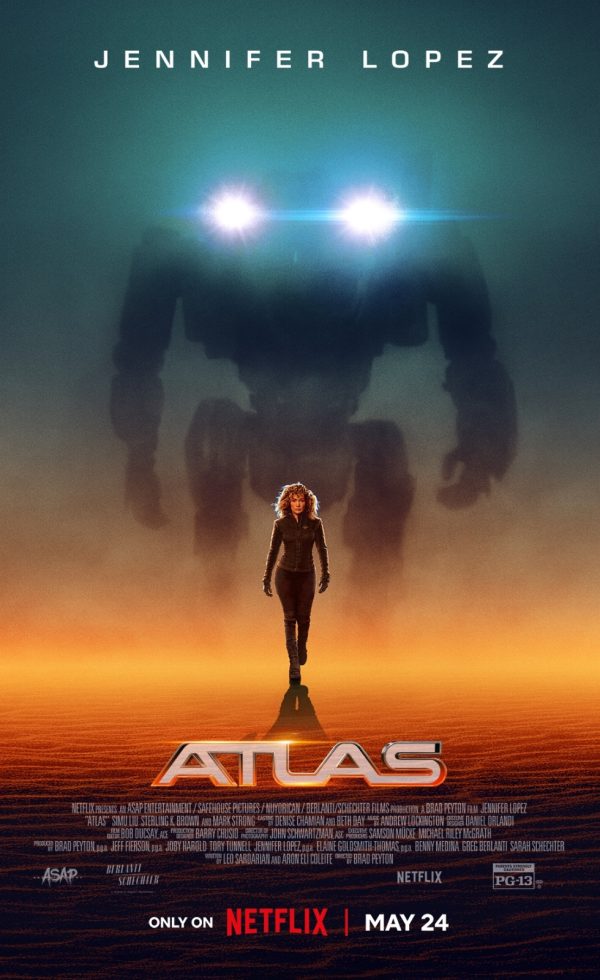Atlas, 2024.
Directed Brad Peyton.Starring Jennifer Lopez, Simu Liu, Sterling K. Brown, Abraham Popoola, Lana Parrilla, Lesley Fera, Greg Cohan, Briella Guiza, Janis Ahern, Rich Sands, Stephanie Heiner, Alfredo Tavares, Paul Ganus, Charlie Hewson, Logan Hunt, Adia Smith-Eriksson, Jared Shimabukuro, Ashley J. Hicks, Zoe Boyle, Ernesto Chaverri, and Mark Strong.

SYNOPSIS:
In a bleak-sounding future, an A.I. soldier has determined that the only way to end war is to end humanity.

Enraging and wrongheaded, director Brad Peyton’s Atlas sends the unethical, harmful message that since people suck, emotional connections with AI is the way of the future.
It takes something extremely misguided or repulsive to get me worked up with pure hatred about a film, but these filmmakers (the screenplay comes from Leo Sardarian and Aron Eli Coleite) accomplish this early when, in this near-future dominated by robots, Jennifer Lopez’s closed-off, traumatized, former data analyst Atlas Shepherd is pushed into embracing new technology that involves a mental link with an AI-powered mech for approval to accompany some space rangers on a mission to a hidden, remote, harsh planet that machines leader Harlan Shepherd (Simu Liu) and his followers fled to following some early successful human counterattacks.

As the name gave away, Atlas also has a connection to Harlan in that the android was created by her now-deceased mother, Val (Lana Parrilla), spurring a jealous childhood. Val always showed more interest in her creations rather than her daughter. Meanwhile, Harlan slowly came to the conclusion that society was doomed and should be cleansed, causing him to override his pacifist coding and spark a Terminator-style technological uprising.
Unsurprisingly, this means Atlas feels obligated to bring him to justice, whereas the futuristic military team sees the value in bringing her aboard for psychoanalysis and predicting his strategic moves. Due to a raging storm during their descent onto the planet, Atlas is separated from the crew and further pressured into the mech to attach the earpiece and begin a mental synchronization. Initially, there is a sense that Atlas may end up condemning those becoming increasingly reliant on AI, especially since the military seemed capable of winning battles and ridding themselves of Harlan before this technology.

There is also some hesitance in even calling Atlas an action film; it’s not a spectacle since most of the CGI backgrounds are ghastly, and many images are composed primarily of ugly digital visual effects. Instead, it’s about artificial intelligence going to unsettling lengths to present itself appealingly and trustworthy, so Atlas lets vulnerabilities down, allows for rising compatibility, and syncs together to take down the generically motivated villains. It develops a smooth, comforting, standard voice (provided by Gregory James Cohan) similar to what you might find in an Alexa or Google product, asks easy questions to develop a rapport, and consistently promises they will be much more effective in combat when properly synchronized.
The idea of well-meaning versions of artificial intelligence and robots is nothing new, but it does foul and rancid to capitalize on rocky, grim, uncertain times in artistic industries such as movies to essentially tell a story with specific terminology and plot points intended to take common people and warm them up to this technology. Roger Ebert famously reserves scores of 0/thumbs down, not necessarily for embarrassingly incompetent films, but ones that were morally and artistically bankrupt or offensive in some way. Atlas fits that description to a T.

Even if one wants to overlook that unfortunate offputting aspect, there isn’t anything to praise about the set pieces or performance from Jennifer Lopez. There is an hour-long stretch where she bickers with an AI voice, increasingly opening up about her clichéd past, until the inevitable moment when she realizes this technology will not betray humanity. Although if it did betray her at the end, I would probably give Atlas some points and perceive it as a fascinating study of human stupidity and gullibility. Anyway, the connection that develops between woman and AI is played up to sappy levels that culminate in something that feels like a cringeworthy romance. There is nothing of value in this AI propaganda affront to cinema, humanity, and artistic creativity.





